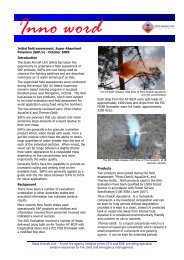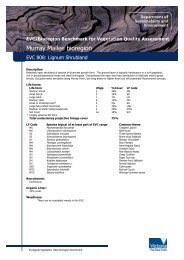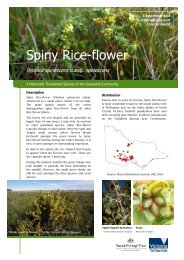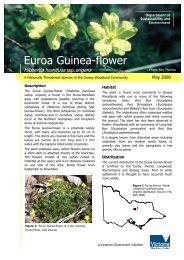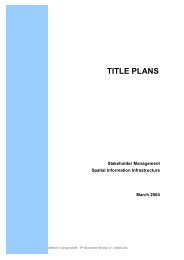Issue 22 Summer 2001 [PDF File - 1.1 MB - Department of ...
Issue 22 Summer 2001 [PDF File - 1.1 MB - Department of ...
Issue 22 Summer 2001 [PDF File - 1.1 MB - Department of ...
You also want an ePaper? Increase the reach of your titles
YUMPU automatically turns print PDFs into web optimized ePapers that Google loves.
dcare Awards<br />
Stock and Land Primary Producer Award<br />
Hi Fert Landcare Award – Wimmera<br />
Bruce and Robyn Dalkin<br />
The judges <strong>of</strong> the Rural Press Primary<br />
Producer Award determined that the<br />
Dalkin’s farm at Armstrong in the<br />
Wimmera is “a very successful, sustainable<br />
and diversified commercial operation,<br />
resulting from a very high standard <strong>of</strong><br />
on-farm and regional planning”.<br />
The Dalkin family has been farming<br />
Westgate since the 1860s and the land<br />
was progressively cleared by the turn <strong>of</strong><br />
the century. During the early 1900s the<br />
farm’s main income was from oat crops,<br />
cut for chaff, and then in the ’50s the<br />
Dalkins took advantage <strong>of</strong> the wool boom<br />
and also ran beef cattle and fat lambs.<br />
The first vineyard was planted in 1960.<br />
Times got tough in the 1990s for the<br />
Dalkins when wool prices plummeted.<br />
It got to the point where they faced a<br />
major decision – to farm or not to farm!<br />
Diversification and a positive approach<br />
was the turning point and today Bruce<br />
and Robyn have 35 acres <strong>of</strong> grape vines,<br />
operate a small winery, <strong>of</strong>fer a bed and<br />
breakfast and small conference facility, run<br />
3000 merino sheep for wool production,<br />
are trialling olives and considering other<br />
Mediterranean crops such as lavender.<br />
The Dalkins completed a whole farm<br />
plan, which identified the small pockets<br />
<strong>of</strong> land suitable for high production like<br />
vines and the marginal land, which meant<br />
that intensive sheep grazing could be<br />
avoided in those areas.<br />
The Dalkins irrigate their vineyard using<br />
water from the Ararat/Great Western<br />
Wastewater Reuse Scheme, vines are<br />
straw-mulched and winter active pasture<br />
grass weeds are sown which provide good<br />
soil cover and minimal competition.<br />
Sheep are rotationally grazed on<br />
predominantly phalaris, curry cox foot<br />
and sub-clover pastures. Deep-rooted<br />
perennial grasses have been established to<br />
bind the soil and avoid erosion <strong>of</strong> exposed<br />
soil by summer storms. Lucerne is planted<br />
on hillsides to take advantage <strong>of</strong> summer<br />
rainfall and to reduce watertable recharge.<br />
The Dalkins have maintained areas <strong>of</strong><br />
remnant vegetation and encouraged<br />
regeneration. They have revegetated<br />
steep country with native grasses and<br />
vegetation and planted tree corridors<br />
to control salinity areas and link existing<br />
tree blocks. A previously non-productive<br />
saltpan has been restored to pasture.<br />
A major drainage line has been grassed<br />
and timbered to provide a nutrient sink<br />
for water leaving the property.<br />
Robyn and Bruce Dalkin<br />
enjoy the fruits <strong>of</strong> their labours.<br />
On the back <strong>of</strong> changing their farming<br />
practices, Bruce and Robyn have ventured<br />
into farm tourism and <strong>of</strong>fer bed and<br />
breakfast accommodation in a 1950s<br />
farmhouse on the property. A picturesque<br />
location, boutique winery and a diverse<br />
farming enterprise make Westgate an<br />
attractive and relaxing spot for city<br />
dwellers to retreat.<br />
The judging panel for the Victorian<br />
Landcare Award – Wimmera commented<br />
that not only do the Dalkins have a long<br />
history <strong>of</strong> Landcare, but they display<br />
a great deal <strong>of</strong> initiative in thinking<br />
outside <strong>of</strong> the square to work with<br />
the natural environment, rather than<br />
against it. Obviously a successful and<br />
sustainable approach to farming.



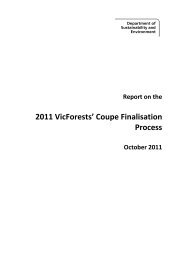
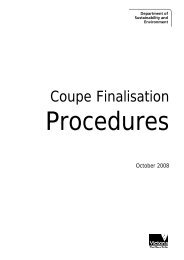
![Metcalfe State Forest Fauna Species List [PDF File - 16.9 KB]](https://img.yumpu.com/22024301/1/184x260/metcalfe-state-forest-fauna-species-list-pdf-file-169-kb.jpg?quality=85)
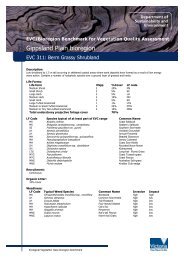
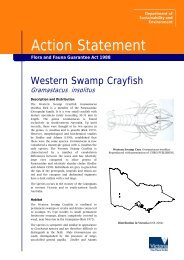
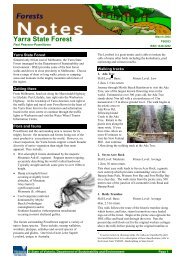
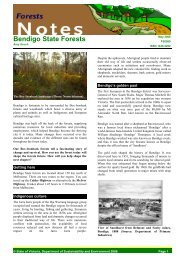
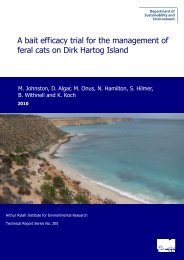
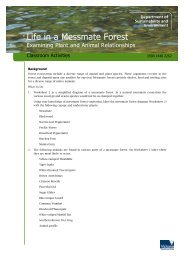
![PPE Price List for Wildlife Volunteers [PDF File - 20.3 KB]](https://img.yumpu.com/15321634/1/190x135/ppe-price-list-for-wildlife-volunteers-pdf-file-203-kb.jpg?quality=85)
